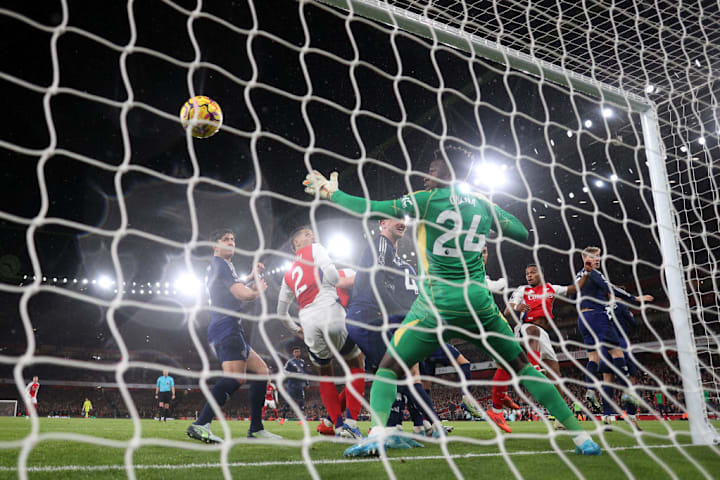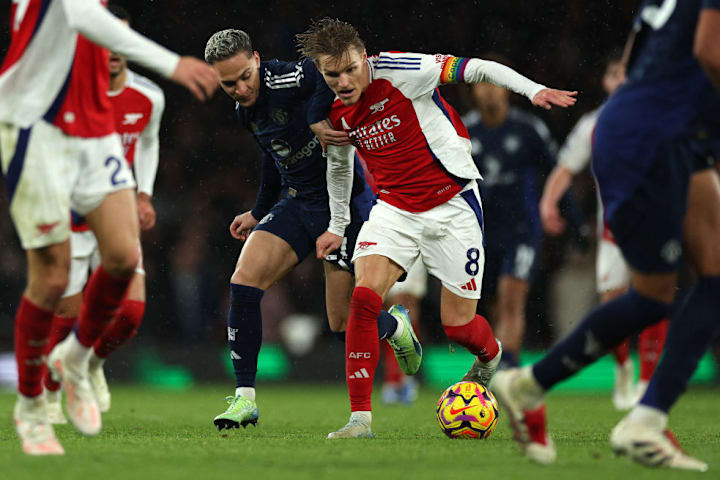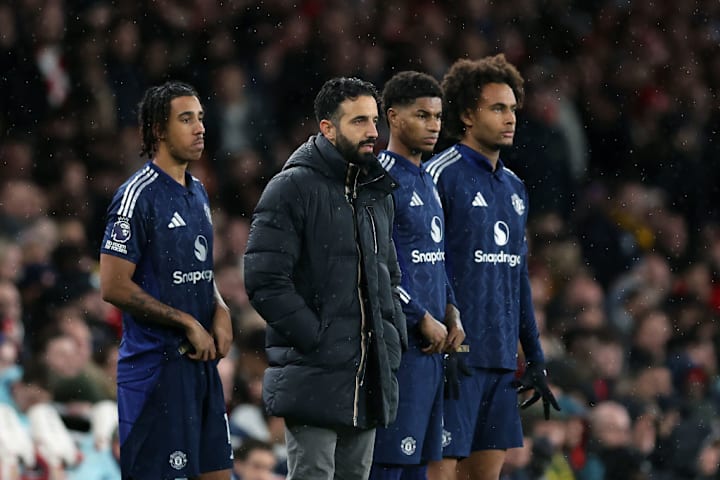- Arsenal scored twice from set-pieces to beat Man Utd
- Gunners couldn't play through opponent in open play
- Ruben Amorim beaten for the first time since arriving
Arsenal secured a 2-0 Premier League victory over Manchester United at a wet Emirates Stadium on Wednesday night, continuing to build momentum after an impressive return to form.
For United, it marked a first defeat for new head coach Ruben Amorim in his fourth game in charge, presenting the Portuguese with fresh questions as he gets to grips with the job at hand.
The Gunners were probably the better side on the balance of play, but it took a set-piece and a Jurrien Timber header early in the second half to finally get ahead. Once the deadlock was broken and Mikel Arteta’s side had figured out the mayhem they could cause with dead ball situation, things were a little more straightforward and a second set-piece goal came from William Saliba.
How the game unfolded
Arsenal had the ball in the net within minutes of the opening kick-off, Andre Onana’s stray pass picked off by Oleksandr Zinchenko. But when Kai Havertz cushioned the ball into the path of Gabriel Martinelli, the German forward was in an offside position. The Gunners soon had another glorious when Thomas Partey misjudged a header mere yards from goal – it hit his shoulder instead.
Although United had teething problems with Amorim’s new system against both Ipswich Town and Bodo/Glimt, the visitors were actually pretty solid defensively. Martinelli had an opportunity where he lashed a left-footed strike wide following a corner, with Arsenal unable to make dominance count.
The Gunners wanted a penalty when a driven cross struck Harry Maguire’s midriff, maybe his arm too, but the referee was unmoved and so were the VAR officials.
United hadn’t really offered anything going forward until the closing stages of the half when Diogo Dalot drilled an effort only not far wide after Maguire’s deflected cutback fell kindly to him.
A similar pattern continued when the second half began, United closing ranks on Arsenal in the final third. As one decent opportunity presented itself to the Gunners, Mason Mount was there to deflect a shot from close friend Declan Rice over the bar.
Eventually, Arsenal’s strength at set-pieces made the breakthrough. Rice whipped a dangerous corner towards the near post and Timber was the one who got his head to the ball, making enough contact with the flick to take it beyond Onana. A near identical corner from Rice only five minutes was only a fraction away from delivering a second, this time off the head of United substitute Joshua Zirkzee.
United thought they had pulled level with a header of their when Matthijs de Ligt powered an effort at goal, only to see David Raya leap across his goal to palm the ball away from danger.
Then came Arsenal’s killer second. This time, the corner from Bukayo Saka was delivered to the far post where Partey was waiting to head back across the six-yard box. Saliba didn’t know much about it, the ball just hitting him in the back and bouncing into the net, but he wheeled away in jubilant celebration and the goal survived a VAR check for a potential offside.
Off the bench, Mikel Merino very nearly headed in a third corner goal, narrowly missing the target.
Arsenal’s cheat code
The Gunners couldn’t find a way through a resolute United defence in open play, but set-pieces have become an enormous weapon for Arteta’s side.
It’s ultimately about an advantage in any way and this is Arsenal’s. On another night, they could have had four goals from corners, all extremely similar deliveries to highlight just how meticulously this has been worked on and polished by set-piece coach Nicolas Jover.
Even with Gabriel sidelined through injury, others made themselves a threat and it was the difference.
Odegaard restricted
Part of the problem for Arsenal in open play is that Martin Odegaard wasn’t allowed to play his usual game by the visiting United midfield and defence. The Gunners captain was constantly swarmed upon whenever he got the ball, losing the space in which to pull strings.
The Norwegian has been such a big influence on Arsenal’s recent burst of form since returning from injury – it’s no coincidence that they struggled without him – but this was another indication of the limitations that can exists if he is not able to operate to his strengths.
Credit for that on this occasion goes to Manchester United, although the defensive structure came at a cost to their own play. It took 42 minutes to have a first shot at goal, on or off target.
Amorim not afraid of big calls
United’s three best performers in the weekend’s thumping win over Everton were Amad Diallo, Joshua Zirkzee and Marcus Rashford, and none of them started here.
With regard to Amad in particular, Amorim spoke after that game about building his physical levels, which would explain not starting twice in four days. Zirkzee’s start against Everton was also down to the particular skills and weaknesses of that opposition, with Arsenal an opponent clearly more suited to Rasmus Hojlund in the eyes of the head coach.
Amorim switched Tyrell Malacia, starting just his second first-team game in 19 months, at half-time and then made a triple substitution shortly after going behind.




